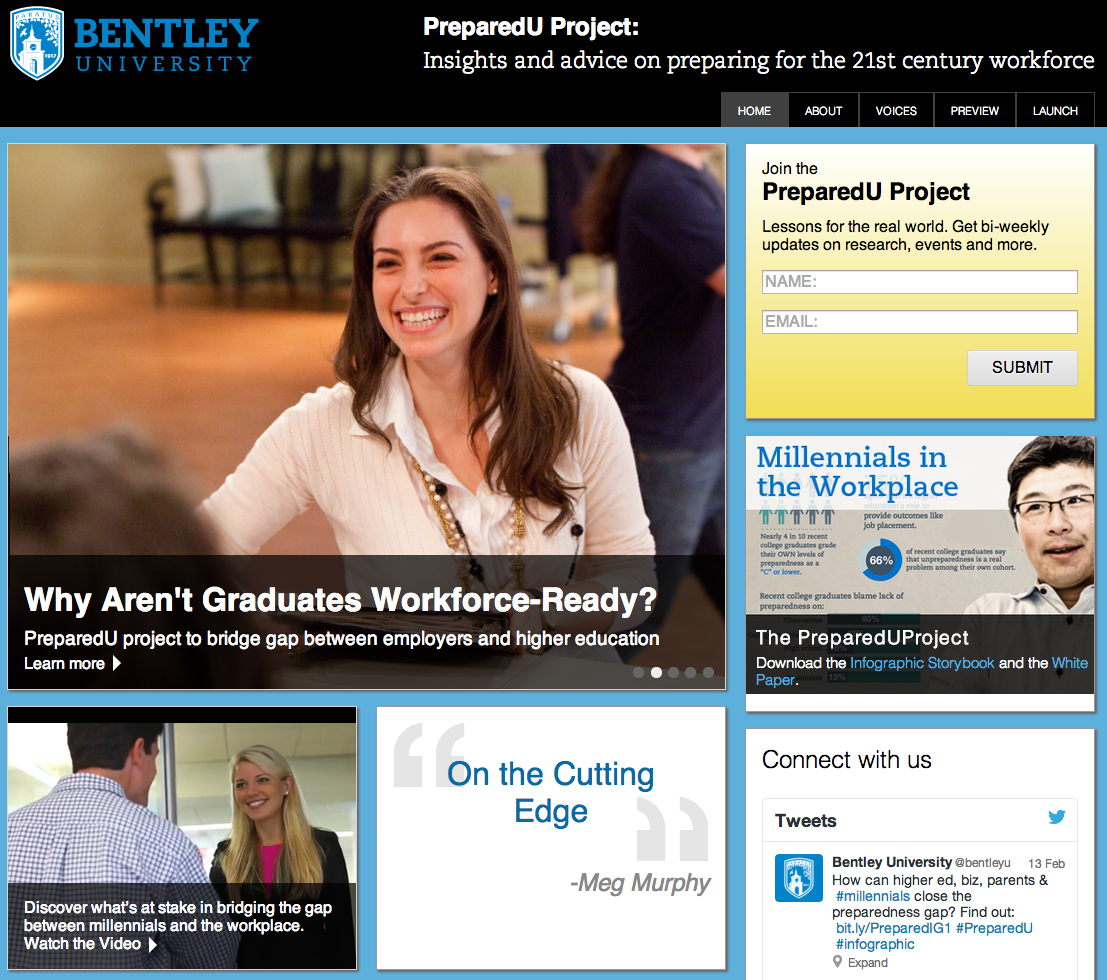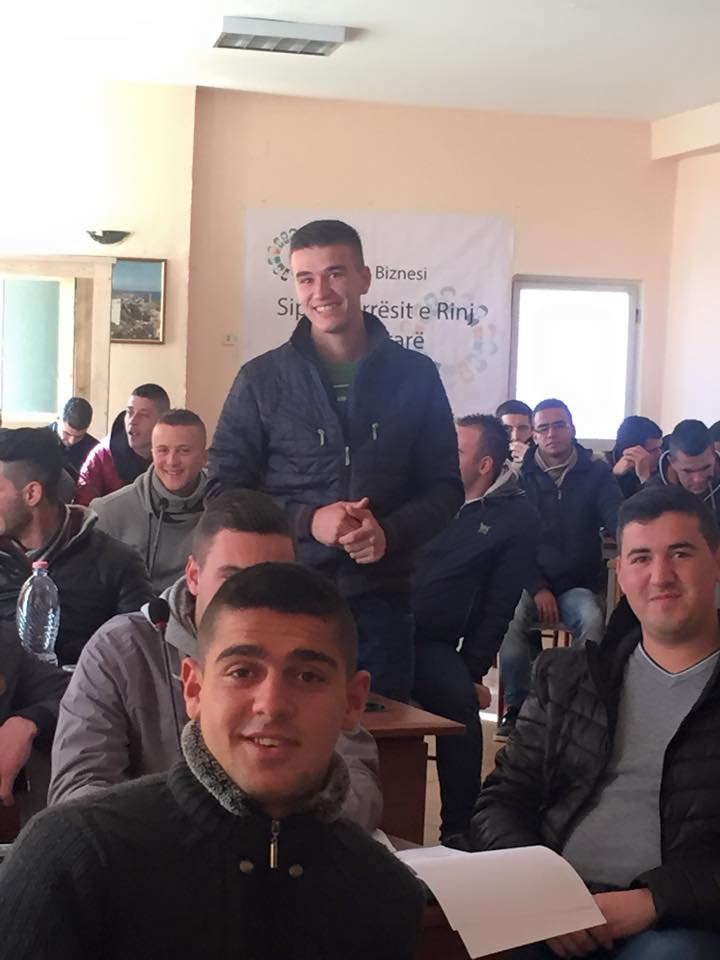Today the nature of work is drastically different than it was five years ago, and while students’ views have changed with this shift, the majority of institutions preparing them to enter the workforce have not.
Recently I attended the Bentley University #PreparedU launch event conference hosted at Bloomberg on the subject of millennials and how under-prepared they are to enter today’s workforce. Before I dive into a few of the more provocative topics covered at this conference however, I must first tip my hat to Bentley University for not only realizing this is an issue and starting a dialogue, but for taking responsibility and instigating change both within its organization and community.
There are currently 80 million millennials either working or entering the workforce. By 2020 millennials will comprise about 50% of the global workforce. While such stats have made the subject of millennials in the workforce a hot topic today, it is still not receiving the attention it deserves. This is an issue that desperately needs to be pushed to the front of the global agenda.
At the conference I thought it was strange that people over age 40 comprised the majority of those on the speaking panels. That said, I understand it is extremely hard to view yourself, or your generation, objectively. Baby boomers and Gen Xers—we do need your help here. I also appreciate the thought behind all of the hard work that went into framing the biggest issues and myths that face the millennial generation as we prepare to enter the workforce today. The proposed solutions to these obstacles were even more impressive and tactful. Finally, Bloomberg was an amazing venue for all of this to take place.
My only criticism is the discussion was never opened up to include those in the audience or participating via Twitter. Yes, people were literally offering their opinions on what was being said in real time via Twitter, and were largely ignored. It was the perfect set up! You had experienced voices from past generations with a ton of organized research, a room full of promising millennials and input from interested people around the world. Let an idea or two be challenged. Prove us wrong. Or maybe not. But get the conversation going because that’s how we can go from a dialogue to creating genuine change. The millennial generation—my generation—must be involved if this dialogue is to become something real, and a conservative presentation model will do nothing to push this issue to the front of the global agenda. To be perfectly clear, a panel of non-millennials talking about a current issue facing millennials, is a good thing. Just don’t control the conversation. Like I said above, we do need your help, but you also need ours. We need to work together. That’s what I realized after attending this conference.
David Burstein, one of the few millennial speakers on a panel, shared his practical perspective regarding the divergent views of higher education and the nature of post-graduate work, from academia to students. David was able to show how differently academia and students view the purpose of higher education by placing it in the context of a buyer-seller relationship. After providing this context he concluded that academics view higher education as a scholarly business, while students view higher education as an employment business. Lets’ face it, while the college experience is extremely important, students’ primary objective is to prepare themselves to be the best choice for prospective employers.
This is not a one-way street however, and it’s not just higher education that has a flawed perspective and resulting message. The message employers promote in regards to the ideal applicant’s dexterity is extremely multifarious and contradictory. If you ask employers what they’re looking for in an entry-level candidate, they generally respond they want a candidate with a mix of soft and functional skills. While I fully agree the best entry-level applicants will have a balanced skill set, it’s obvious that candidates who possess an asymmetrical amount of functional skills, compared to their soft skills tend to be an employer’s first choice in today’s tight job market.
A key cause of this emerging issue, as Gloria Larson the president of Bentley University pointed out, is that corporations feel millennials will not stick around at any one company for very long. As a result, employers hire candidates who can get the most work done with the least amount of initial investment. Yes, millennials are the most highly-educated generation ever, but plugging young people into functionally heavy jobs and not training them, not investing in their futures, whether they will stick around or not is a terrible approach.
During the past recession a lot of companies eliminated training not only for entry-level jobs, but also re-training for employees in different areas. This necessary training is now seen as the colleges’ responsibility from the employers’ perspective, but employers cannot simply outsource training to higher education. Colleges are not here to take over these corporate training duties, nor have they done so, which is exactly why millennials have been left underprepared to enter the workforce. This [training] so necessary for millennials to assimilate into working life has been pushed aside in the same way a child shirks his responsibility to clean his room by pushing everything under the bed.
A problem is something in front of you. A problem requires a solution. A problem is a question proposed for discussion. What we need here is not another discussion, but responsible action. Bentley has started this discussion and has even provided solutions, now it’s time for action. Now that the dirty laundry has been pulled out from under the bed, we need to work together to clean it. Cooperation and understanding is the only way.
So the question I pose is this: Are these so-called issues so deeply rooted in our society that we will simply adapt to them instead of working to solve the root of the problem? Or are we better than that?
Asking this question after making a call to action may seem a bit contradictory, but although I would appreciate getting your feedback on this question, I don’t want to know your opinion on the topic of millennials’ unpreparedness to enter the workforce; I want to know what you’re doing about it.
Zack Shultz is a young entrepreneur whose focus pertains primarily to the hospitality industry. He currently manages a boutique hotel in NYC, and advises startups pursuing innovative concepts within the luxury hospitality and travel sectors. In his spare time he enjoys an active lifestyle and traveling.





